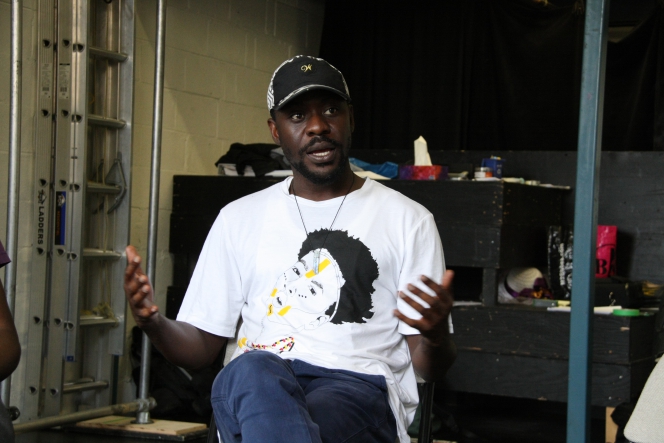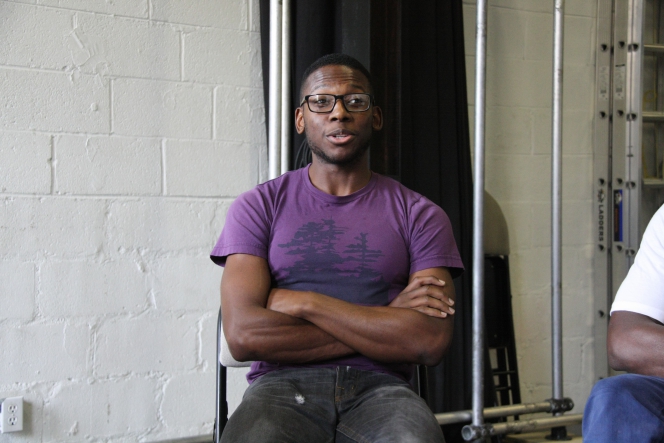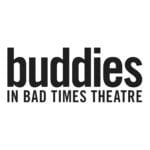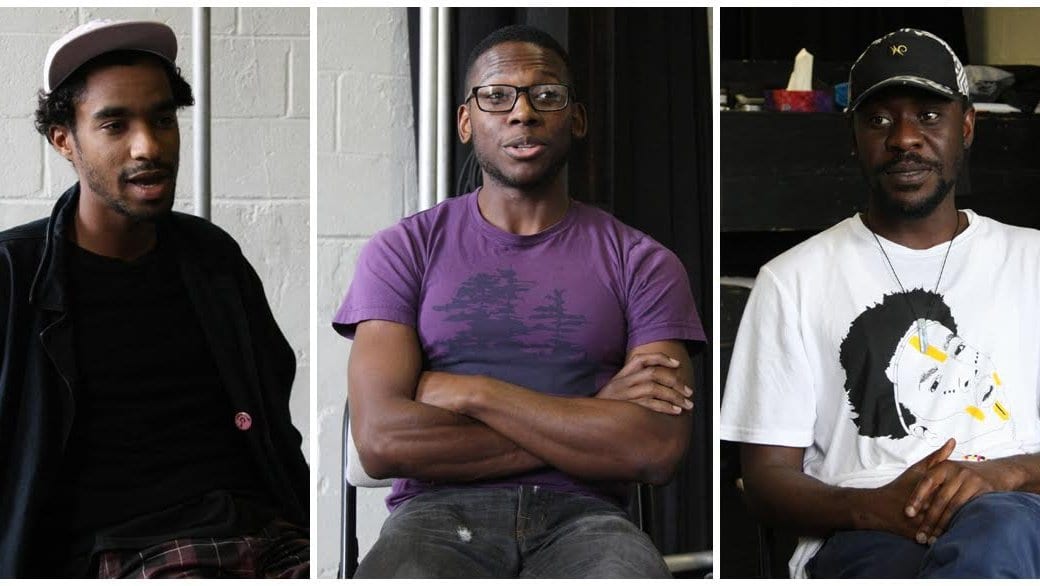This story was created by Xtra's branded content team alongside Buddies in Bad Times Theatre, separate from Xtra's editorial staff.
Dating is hard enough without adding in various identities to the mix. Race, religion, nationality and sexual identity all shape who and how we love.
These themes and more will be explored in the upcoming show, Black Boys, put on by Saga Collectif and Buddies in Bad Times Theatre, which debuts Nov 19, 2016. Starring Stephen Jackman-Torkoff, Thomas Olajide and Tawiah Ben M’Carthy, Black Boys is an intimate exploration of what it means to be queer, black and male today.
The cast sat down with Daily Xtra to talk about dating as queer black men, dealing with stereotypes and finding a “woke” partner.
This interview has been edited for length and clarity.

Do you find that you think about race or racism while dating?
Thomas: I can’t think of anything that affects my dating life today, but I was taught and equipped, in a way, to be aware that as a black man, there are some things to be mindful of — to be aware of the partners that you choose. And that if I was ever accused of anything, that the scales would be tipped against me because I’m a black male in the world, so I’ve had to be very mindful of romantic situations that I’ve been in.
Stephen: I don’t really think about it as something while I’m trying to date — but I think the obvious thing people think about with a question like this is if there’s any racism while dating. But if there’s anyone who is not wanting to connect with me because of that, then I’m happy to not connect with them. I’m pretty creative with how I meet and encounter new people, so I probably wouldn’t use an online dating platform ’cause I know [racism] can happen on there. I’d rather meet people by living my life out, and I usually meet people who are cool.

Thomas: To me online dating doesn’t occur to me — it doesn’t occur to me to go on the internet to find partnership. I feel like I’d probably keep my distance because of the generalizations [based on race] that can happen over the web — the probability of being fetischized are greater, in my mind. Or the possibility of being rejected because of it as well.
What are some of issues that you face while dating as a black man?
Thomas: There’s usually a moment for me where I’m getting into my life experience, specially about my race and my experiences as a black person in the world, and there’s a moment where I can feel the person “click out” — not be able to stay in the discomfort of learning a new reality. I wait and see if they can stay in the discomfort, and that’s usually my gauge, especially when it comes to interracial dating.
Stephen: Similarly, I’ve been with someone before who is white and all can be going swimmingly great but it’s just little things like a black joke — where we could all be in a group and the person says, “No, he’s not a robber, he’s just here,” or, “You’re acting so white.” That’s not a thing. And they don’t mean anything by it, but my whole face just drops. And to use the term “woke,” you just say to yourself like, “Whoa, this person’s not woke,” and you know after that moment that it’s not going to last. I want to be with someone who is aware.
There’s all these tropes and jokes, and I’m young, but as the years go on, I’ve been hearing the same jokes and they’re just bad and boring and they just get really old.
To be fetishized as a black person — there’s different tropes for black men and black women, but can also overlap. So, when you hear things like, “I only date black men,” what do you think those people are assuming about you?
Tawiah: It comes around to the idea of being “woke” — not to say that I don’t appreciate the fact that you find black men attractive — but how much of it is me that you find attractive? How much of that has to do with me as an individual? I find there’s a trope that categorizes me, and all that does is lead to disappointment because there’s a way you’re expecting me to act — there’s a way you’re expecting me to present myself. And I’m not interested in presenting myself in a way that will satisfy your idea of what you think I would be — and for me, that’s fetishization.
But also, due to the fact that I didn’t grow up here, when people say “black” I feel like they’re talking about North American black. There’s a bit of a divide when it comes to how they expect me to represent myself, as a Ghanaian black, which might be different from a Canadian black.

Stephen: I’d say there’s an oversexualization of the bodies and an expectancy of “big parts” across women and men — big booty, big boobs, or a big dick. And also a strong, dominating presence. I’ve had people [I’ve dated] really expecting me to take control. I feel like I’m supposed to be some character. I’ve been with someone who said, “I’ve never been with a black guy before,” and it was an instant turn-off, but it was also like, what is this black guy you’ve never been with?
Thomas: For me, I think there’s an expectation for hypermasculinity. Dominance, or a kind of primal energy. The tricky thing about that, though, is that you become representative of an entire race and what happens when your temperament is actually those things? What if your body is muscular? What if you do like to be dominant in a sexual relationship and you happen to be black? You have the parts that we stereotype as the black man and yet there’s an individual inside. And so it also creates a limitation of expression — you don’t want to express those things because they’re deemed stereotypically black, but they actually happen to be a part of you as an individual, so it’s a very complex cul de sac you find yourself in.
In some circumstances, I’ve developed sometimes a bit of a self-consciousness and insecurity around those characteristics because I don’t want to be labelled as that, even though those might be my characteristics at that time.
Black heterosexual masculinity — being macho, tough, dominant — is very much embedded in black communities. How do you navigate this as queer black men?
Thomas: I think everyone is under the burden of patriarchy, including men. And for black men, you’ve got the echoes of slavery and the violence that’s taking place on the black male body. So we’re at a time where there’s a communal feeling in the black community that we’re trying to recapture our empowerment and autonomy which is, in one way, great, but in another way, creates inflexibility that anything that seems effeminate is attacked.

Tawiah: It’s something that I negotiate daily, within myself and without — how I present myself to the world and the expectation of this body that I carry, depending on what space I’m in. It’s something I’m very aware of when I’m outside and when I’m encountering other bodies and other racialized bodies.
Stephen: Black masculinity is not something I negotiate on a daily basis. It’s not something that I find that I’m in a personal daily negotiation with, but I think that could be because of the circles I move and maybe because I feel strong inside myself right now and safe with who I’m around. And if it [my masculinity] is questioned right now, that’s okay.
What do you hope Black Boys will teach its audience about love and relationships?
Thomas: For me, I don’t have anything to teach, but it’s more of a sharing and an offering of who I am — certain ideas and topics, and one hopes that the audience finds empathy. And I think that theatre — and any storytelling — has the ability to build an empathetic bridge between people who thought at first that they were different from one another, but then they sit down and are told the story, see that they actually have a lot in common, fundamentally, with others. I hope that this exchange happens.
Tawiah: I hope that when I speak, share or create work, that it inspires those who are younger and have similar experiences to me. That’s very important to me — that they’re not alone in their struggle, that there’s a shared experience and that there’s other stories that include them and enriches them to share and create and open doors to invite others in.
Stephen: I don’t know about love. But I love “love.” I’m still figuring it out, but honestly, if they could know how to feel love, and if that’s a good thing for them that happens after this show, then that’s great. It can be hard to feel love and encounter it depending on how you’ve grown up — just how love was given to you and shared. So hopefully the show can teach them to feel it deeper. I hope the show teaches them to feel everything deeper.
Black Boys
Nov 19–Dec 11, 2016
Buddies in Bad Times Theatre, 12 Alexander St, Toronto
buddiesinbadtimes.com


 Why you can trust Xtra
Why you can trust Xtra